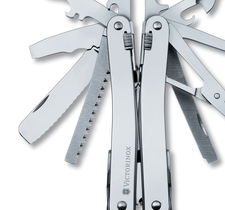Platform-independent toolkit – Swiss File Knife
SwissArmy Knives

© Lead Image © Victorinox, PHOTOPRESS
Swiss File Knife replaces more than 100 individual command-line tools at once, but it still fits on a USB stick and runs on all major operating systems.
If you work on the command line, you inevitably use many utilities and tools, all of which work differently, especially if you have to switch between operating systems. To simplify your life, take a look at Swiss File Knife (SFK) [1]: This tool replaces many conventional command-line programs with functions that operate consistently and follow the same syntax across operating systems. Additionally, SFK offers a way to combine individual commands in scripts. A short overview of the tool's many options is given in the "Swiss File Knife Capabilities" box.
SFK is available as a precompiled program with no dependencies, so you can take it anywhere you like on a USB stick and use it for on-site maintenance or rescue work. In addition to 32- and 64-bit binaries for Linux, you will find versions for the Raspberry Pi and other ARM machines, as well as Windows and Mac OS X, allowing you to work on all the major systems with the same tool.
Choosing your Weapons
All versions of SFK can be found on the tool's SourceForge page [2] below Files | 1-swissfileknife | <version> (v1.7.2 when this issue went to press). In the list, then click on the EXE file for your system, which you can identify by looking at the file name.
[...]
Buy this article as PDF
(incl. VAT)
Buy Linux Magazine
Subscribe to our Linux Newsletters
Find Linux and Open Source Jobs
Subscribe to our ADMIN Newsletters
Support Our Work
Linux Magazine content is made possible with support from readers like you. Please consider contributing when you’ve found an article to be beneficial.

News
-
Manjaro 26.0 Primary Desktop Environments Default to Wayland
If you want to stick with X.Org, you'll be limited to the desktop environments you can choose.
-
Mozilla Plans to AI-ify Firefox
With a new CEO in control, Mozilla is doubling down on a strategy of trust, all the while leaning into AI.
-
Gnome Says No to AI-Generated Extensions
If you're a developer wanting to create a new Gnome extension, you'd best set aside that AI code generator, because the extension team will have none of that.
-
Parrot OS Switches to KDE Plasma Desktop
Yet another distro is making the move to the KDE Plasma desktop.
-
TUXEDO Announces Gemini 17
TUXEDO Computers has released the fourth generation of its Gemini laptop with plenty of updates.
-
Two New Distros Adopt Enlightenment
MX Moksha and AV Linux 25 join ranks with Bodhi Linux and embrace the Enlightenment desktop.
-
Solus Linux 4.8 Removes Python 2
Solus Linux 4.8 has been released with the latest Linux kernel, updated desktops, and a key removal.
-
Zorin OS 18 Hits over a Million Downloads
If you doubt Linux isn't gaining popularity, you only have to look at Zorin OS's download numbers.
-
TUXEDO Computers Scraps Snapdragon X1E-Based Laptop
Due to issues with a Snapdragon CPU, TUXEDO Computers has cancelled its plans to release a laptop based on this elite hardware.
-
Debian Unleashes Debian Libre Live
Debian Libre Live keeps your machine free of proprietary software.

